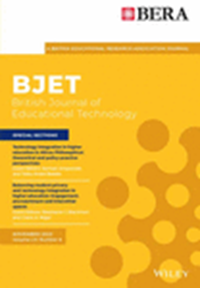Preservice teachers' learning by design through space construction in the metaverse
IF 6.7
1区 教育学
Q1 EDUCATION & EDUCATIONAL RESEARCH
引用次数: 0
Abstract
Teachers who know what, how and why to teach are essential for successful student learning. However, many preservice teachers (PSTs) lack teaching experience and the ability to integrate theory and practice. To help bridge this gap, this study employed a learning‐by‐design project approach in which 22 Korean PSTs developed lesson plans for middle school English classes, constructed virtual classrooms in the metaverse based on their English lesson plans, and conducted microteaching in the virtual classrooms. The study used a qualitative research method and focused on an emic perspective with multiple data sets, including the PSTs' reflection papers and post‐interviews as primary data, and their lesson plans, virtual classrooms and recordings of microteaching as secondary data. The results showed that the project supported learning by design, and that it also helped PSTs understand learners and learning, redefine the teacher's role as a designer and facilitator, connect theories to practice and improve their teaching skills. The findings can be used as a reference for future teacher training. What is already known about this topic Teachers' content, pedagogical and technological knowledge and skills are essential attributes for effective performance. Preservice teachers (PSTs) have difficulty transferring their knowledge to real classrooms because their knowledge often focuses on the ‘know‐what’ of teaching, but not on the ‘know‐how’. Microteaching in virtual environments helps PSTs connect knowledge and practice and prepare for real classroom situations. What this paper adds The study applied a learning‐by‐design approach to preservice teachers' microteaching to help them connect their pedagogical knowledge to classroom practice. The study focused on describing how the PSTs' virtual classroom design influenced the way they planned and implemented their microteaching. Implications for practice and/or policy Teacher educators can incorporate the design‐based approach into their teacher training modules to help teachers understand learner needs when planning and implementing English lessons. Teachers can develop technological literacy and positive attitudes about using technology in their classrooms.职前教师通过元宇宙中的空间建构进行设计学习
知道 "教什么"、"怎么教 "和 "为什么教 "的教师对学生的成功学习至关重要。然而,许多职前教师(PSTs)缺乏教学经验和理论与实践相结合的能力。为了缩小这一差距,本研究采用了 "设计学习 "项目方法,让 22 名韩国职前教师为初中英语课程制定教案,根据他们的英语教案在元世界中构建虚拟教室,并在虚拟教室中开展微课教学。研究采用了定性研究方法,侧重于情感视角,并使用了多种数据集,包括作为主要数据的 PSTs 反思论文和后访谈,以及作为次要数据的他们的教案、虚拟教室和微课教学录音。研究结果表明,该项目支持 "设计学习",同时也帮助专业教师理解学习者和学习,重新定义教师作为设计者和促进者的角色,将理论与实践联系起来,并提高他们的教学技能。本主题的已知内容教师的教学内容、教学法和技术知识与技能是有效教学的基本要素。职前教师(PSTs)很难将他们的知识迁移到真实的课堂中,因为他们的知识往往集中在教学的 "知道什么 "上,而不是 "知道如何做 "上。对实践和/或政策的启示:教师教育工作者可以将基于设计的方法纳入教师培训模块,帮助教师在规划和实施英语课程时了解学习者的需求,培养教师的技术素养和在课堂上使用技术的积极态度。
本文章由计算机程序翻译,如有差异,请以英文原文为准。
求助全文
约1分钟内获得全文
求助全文
来源期刊

British Journal of Educational Technology
EDUCATION & EDUCATIONAL RESEARCH-
CiteScore
15.60
自引率
4.50%
发文量
111
期刊介绍:
BJET is a primary source for academics and professionals in the fields of digital educational and training technology throughout the world. The Journal is published by Wiley on behalf of The British Educational Research Association (BERA). It publishes theoretical perspectives, methodological developments and high quality empirical research that demonstrate whether and how applications of instructional/educational technology systems, networks, tools and resources lead to improvements in formal and non-formal education at all levels, from early years through to higher, technical and vocational education, professional development and corporate training.
 求助内容:
求助内容: 应助结果提醒方式:
应助结果提醒方式:


